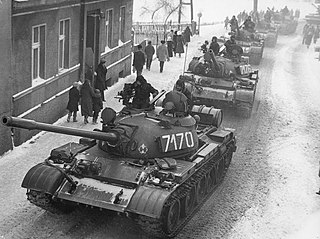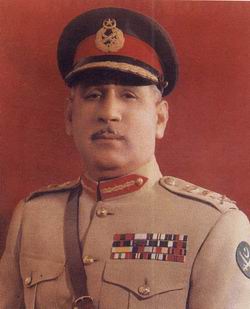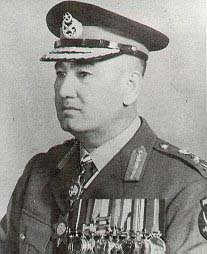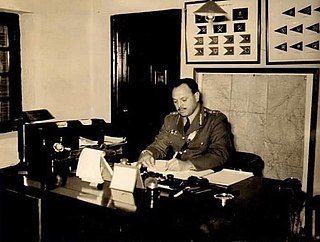
West Pakistan was the western province of Pakistan, one of the two provincial exclaves created under the One Unit Scheme in 1955 in Pakistan. It was created to ensure population-based equality with its eastern counter-part and it was dissolved to once again form former provinces for the General Elections in 1970 under the 1970 Legal Framework Order.

Agha Muhammad Yahya Khan was a Pakistani military officer, who served as the third president of Pakistan from 1969 to 1971. He also served as the Commander-in-Chief of the Pakistan Army from 1966 to 1971. Along with Tikka Khan, he is considered the chief architect of the 1971 Bangladesh genocide.

Martial law is the replacement of civilian government by military rule and the suspension of civilian legal processes for military powers. Martial law can continue for a specified amount of time, or indefinitely, and standard civil liberties may be suspended for as long as martial law continues. Most often, martial law is declared in times of war and/or emergencies such as civil unrest and natural disasters. Alternatively, martial law may be declared in instances of military coup d'états.

Iskandar Ali Mirza was a Pakistani politician, statesman and military general who served as the Dominion of Pakistan's fourth governor-general of Pakistan from 1955 to 1956, and then as the Islamic Republic of Pakistan's first president from 1956 to 1958.

Tikka Khan was a Pakistani military officer who served as the first chief of the army staff from 1972 to 1976. Along with Yahya Khan, he is considered a chief architect of the 1971 Bangladesh genocide which according to independent researchers led to the deaths of 300,000 to 500,000 people.

General Muhammad Musa Khan was a Pakistani senior military officer who served as the 4th Commander-in-Chief of Pakistan Army from 1958 to 1966, under president Ayub Khan. Following his tenure as C-in-C of the Army, he later became a politician.

Mohammed Attiqur Rahman, MC was a senior general in the Pakistan Army, a noted military historian, and a senior government official. He was the martial law administrator (MLA) of West Pakistan in General Yahya Khan's military regime. He was educated at St.Paul's school, London and joined IMA in 1939 with a sword of Honour and then joined 4th/12th FFR. He was the last Governor of West Pakistan and implemented the dissolution of the One Unit scheme, after which he became the first Governor of Punjab province.
Miangul Aurangzeb was the last Wali Ahad of the former Swat State, the son of the last Wali of Swat, Miangul Jahan Zeb, and the son-in-law of the former president of Pakistan, Muhammad Ayub Khan. He served in the National Assembly of Pakistan and as governor of Balochistan and subsequently as governor of the Khyber-Pakhtunkhwa.
Events from the year 1958 in Pakistan.

The Fourth Balochistan Conflict was a five-year military conflict in Balochistan, the largest province of Pakistan, between the Pakistan Army and Baloch separatists and tribesmen that lasted from 1973 to 1977.

General elections were held in Pakistan on 7 December 1970 to elect members of the National Assembly. They were the first direct general elections since the independence of Pakistan and ultimately the only ones held prior to the independence of Bangladesh. Voting took place in 300 general constituencies, of which 162 were in East Pakistan and 138 in West Pakistan. A further thirteen seats were reserved for women, who were to be elected by members of the National Assembly.
General Sawar KhanNI(M) HI(M) SBt was a four-star general of the Pakistan Army who was the Governor of the largest province, Punjab and the Vice Chief of Army Staff during the era of General Muhammad Zia-ul-Haq, when Zia was simultaneously the Chief of Army Staff (Pakistan) and the President of Pakistan.
The political history of Pakistan is the narrative and analysis of political events, ideas, movements, and leaders of Pakistan. Pakistan gained independence from the United Kingdom on 14 August 1947, when the Presidencies and provinces of British India were divided by the United Kingdom, in a region which is commonly referred to as the Indian subcontinent. Since its independence, Pakistan has had a colorful yet turbulent political history at times, often characterized by martial law and inefficient leadership.

The Governor of Balochistan is the head of the province of Balochistan, Pakistan. The post was established on 1 July 1970, after the dissolution of West Pakistan province and the end of One Unit. Under Pakistan's current parliamentary system, the governorship is a ceremonial position, as a symbol of the federation. The governor is appointed by the centre, whereas the principal head of the provincial government remains the elected Chief Minister of Balochistan.

General Abdul Hamid KhanHQA SPk SQA was a senior officer in the Pakistan Army. During the Indo-Pakistani War of 1965, he led the Pakistan 11th Division to victory in the Battle of Kasur. He served as the Chief of Staff of the Pakistan Army under President Yahya Khan and led the army during the Indo-Pakistani War in 1971. He is accused of inflicting genocide during the Bangladesh Liberation War.

Vice Admiral Syed Mohammad AhsanHQA, SPk, DSC, DMM, LOM often known as S. M. Ahsan, was a senior admiral of the Pakistan Navy who was the Commander in Chief of the Pakistan Navy, serving under President Ayub Khan from 1966 until 1969.

Mohammad Iqbal KhanNI(M) HI(M) SI(M) SBt (1924–2000) was a senior general in the Pakistan Army who served as the third Chairman Joint Chiefs of Staff Committee from being appointed in 1980 until 1984.

The 1958 Pakistani military coup was the first military coup in Pakistan that took place on 27 October 1958. It resulted in the toppling of Iskandar Ali Mirza, the president of Pakistan, by Muhammad Ayub Khan, the commander-in-chief of the Pakistan Army.

The Commander-in-Chief of the Pakistan Army was the professional head of the Pakistan Army from 1947 to 1972. The C-in-C was directly responsible for commanding the army. It was an administrative position and the appointment holder had main operational command authority over the army.















